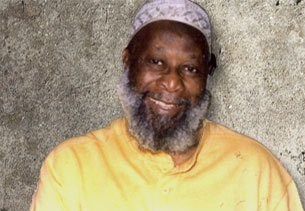By Rasul Miller
Today’s post features a short talk by Sekou Odinga about the need to free political prisoners held in the United States. This FRED Talk (Facing Race, Elevating Democracy) was part of a series organized by Race Forward: The Center for Racial Justice Innovation. Sekou Odinga is a Black power activist who served over 30 years in prison after taking part in the liberation of Assata Shakur from prison in 1979. Odinga’s story provides a compelling example of Muslims’ participation in the radical activism of the Black Power movement beginning in the 1960s. Muslims like Sekou Odinga, Saafiya Bukhari and Dhoruba Bin Wahad were members of the Black Liberation Army, while others like Dr. Muhammad Ahmad and Sterling X participated in organizations like the Revolutionary Action Movement and the Republic of New Afrika. Often these organizations collaborated, and their membership overlapped. Odinga, like many Black radical activists, was inspired by the life and legacy of Malcolm X during his youth. He joined the Organization of Afro-American Unity, the revolutionary Pan-African organization that Malcolm X founded, which also attracted other influential Muslim activists like Sallahudin and Lumumba Shakur who inspired many participants in the Black Liberation movement to adopt the Shakur family name. Odinga later served as a founding member of the Bronx chapter of the Black Panther Party and was invited to travel to Algeria in 1970 to help organize the international section of the Party.

A picture of Sekou Odinga in his younger days, prior to his 33 year incarceration.
In this FRED Talk, Odinga dispels the myth that America has no political prisoners by speaking on the circumstances surrounding his own imprisonment and the imprisonment of several other activists. He remarks that,
“All freedom struggles against oppressive governments produce political prisoners. This is a historical fact. We can go back as far as Jesus Christ, Peace be upon him, who was himself a political prisoner of the Roman empire, just as Leonard Peltier, Aafia Siddiqui, and 13 members of the Black Panther Party are political prisoners of the U.S. empire.”
Elsewhere, Odinga has recounted facing torture when initially captured by police in 1981, describing how he was burned by cigars, brutally beaten and had his head flushed down toilets in an attempt to pressure him to provide information about other activists. In this talk, he describes some of the horrors associated with the FBI’s infamous COINTELPRO program, and links this history to the disturbing recent Black Identity Extremist (BIE) categorization used to justify the surveillance and criminalization of Black Lives Matter activists.
 Alhamdulillah, Sekou Odinga was released from prison on November 25, 2014. Since his release, he has continued speaking on behalf of the many political prisoners still incarcerated in the United States for their involvement in radical Black activism during the era of COINTELPRO and has been an active member of the Muslim community in New York City. Odinga’s personal history reminds us that Black Muslims were once at the forefront of radical activism and helped to pioneer power building strategies for aggrieved communities in America. Perhaps his life and work will inspire us to rediscover the potential for our faith to spark liberatory transformation for both individuals and communities.
Alhamdulillah, Sekou Odinga was released from prison on November 25, 2014. Since his release, he has continued speaking on behalf of the many political prisoners still incarcerated in the United States for their involvement in radical Black activism during the era of COINTELPRO and has been an active member of the Muslim community in New York City. Odinga’s personal history reminds us that Black Muslims were once at the forefront of radical activism and helped to pioneer power building strategies for aggrieved communities in America. Perhaps his life and work will inspire us to rediscover the potential for our faith to spark liberatory transformation for both individuals and communities.
Click the link here to watch his entire talk: https://youtu.be/yLsZFLnJDr0






No comments